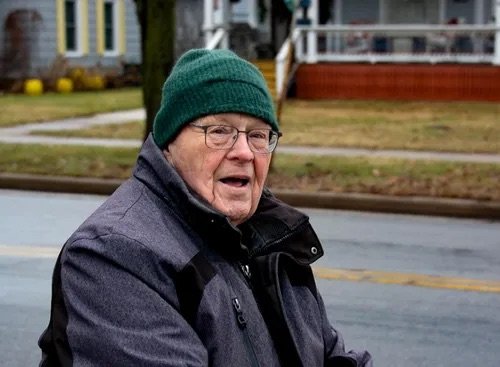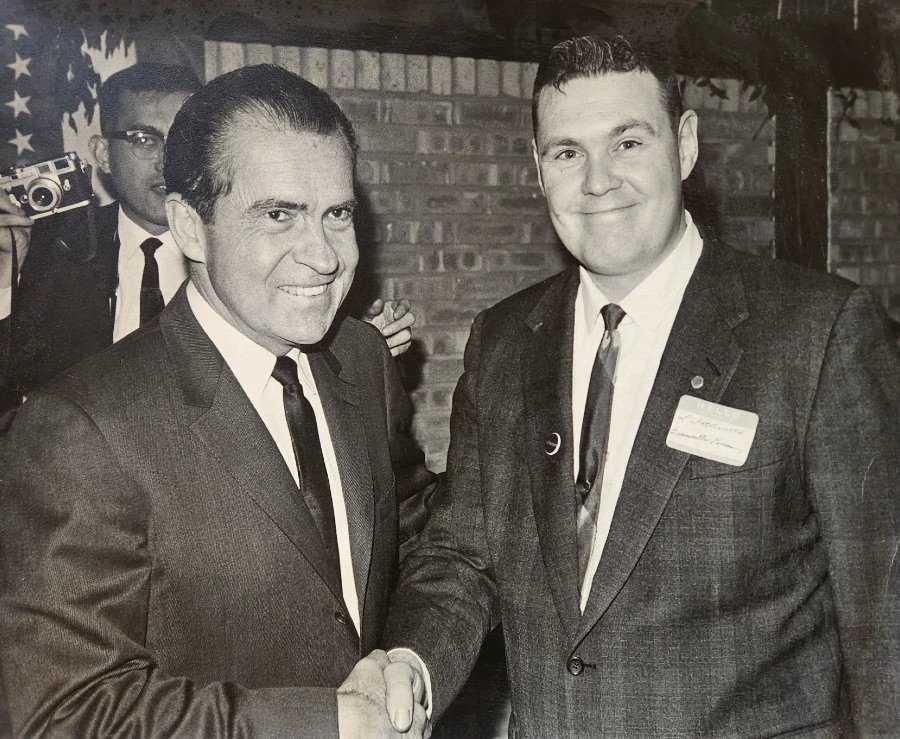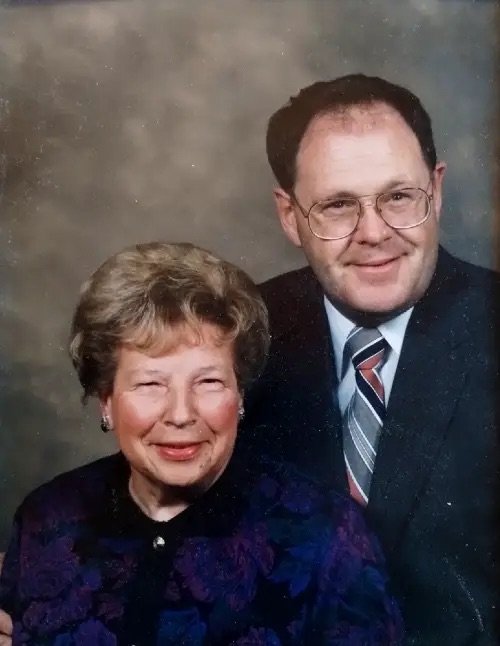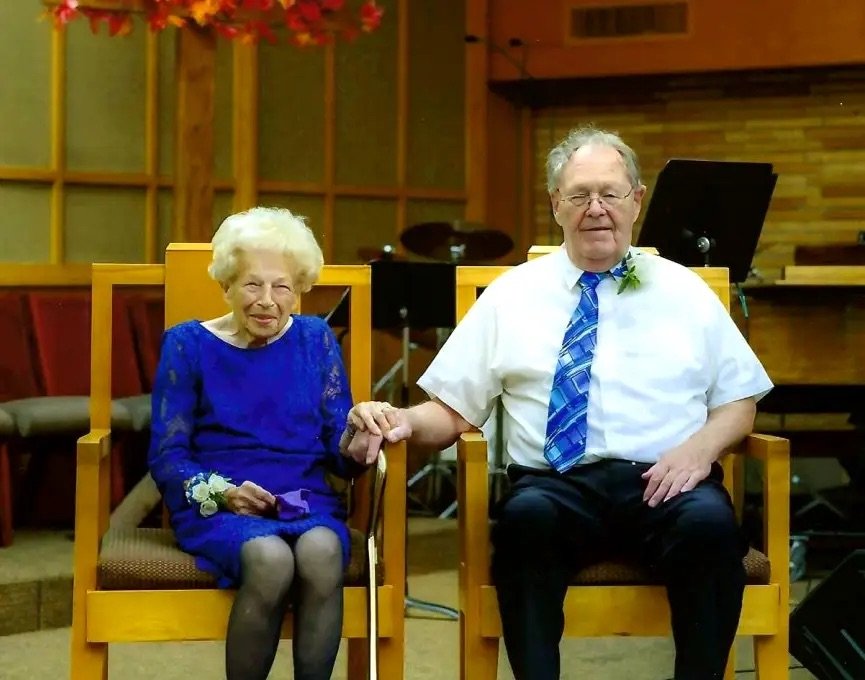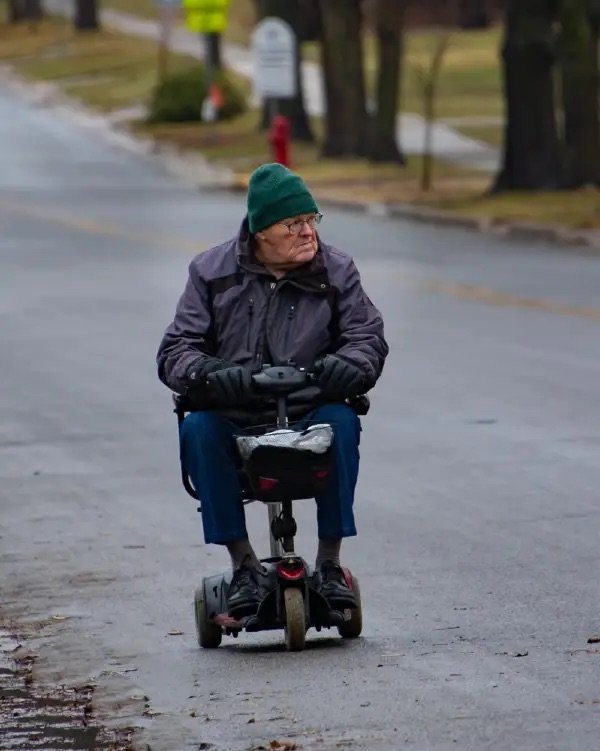Duke Farnsworth
Many know Mr. Farnsworth for his daily scooter trips downtown and back. But his story is much more interesting.
Lewis 'Duke' Farnsworth
“Hard times create strong men.”
That quote from a contemporary novel [1] could easily represent the life of Lewis Farnsworth, whom most refer to as ‘Duke.’ Nothing was given to Farnsworth, not as a child, nor a young man, nor an adult. He learned early that only hard work would provide what he needed in life. And few have worked harder.
Lewis Farnsworth was born on the Brigham farm just north of Evansville, the farm now owned by the Gildner family. The farmhouse is still there, where he was born in 1938, a 13-pound breech baby. It is said the bed broke during his birth – and he says his dad passed out.
When Farnsworth was young, his father purchased a farm in the Kickapoo valley near Ontario. The older man chose that part of the state because farms were more affordable.
His father put Lewis to work at an early age. Their relationship was essentially a business one. Lewis was compensated but also expected to pay his way for food and clothing. As a young man, Lewis cut logs for fence posts, earning $10 a week.
Despite working with his dad on the farm in Ontario, Farnsworth maintained ties to Evansville, hitchhiking back and forth to his hometown. When traveling in winter, he often wrapped himself in newspapers, not having adequate winter clothing to stay warm. Catching a ride not only meant getting to his destination - but also warmth.
A good-looking young man, he sometimes found rides with those who had other plans for him. By luck or intuition, he knew when to run and hide. He recalls when a motorcyclist gave him a lift while hitchhiking near Devil’s Lake. The rider sped down the south slope of the Baraboo Hills on Hwy 12, giving Duke a great scare. The cyclist took Farnsworth 18 miles past his turn, forcing him to hitch back.
Lewis was not a stellar student. He attended country schools around Evansville and graduated from the eighth grade, which was the upper limit of his formal education.
Farnsworth and his dad had a complicated bond. By the time Lewis was 14, they were ready to part ways. Some say his father kicked him out of the house, but Farnsworth says the split was mutual. Either way, it was only temporary, as Lewis Farnsworth and his father had an on-again, off-again relationship that included the two men sharing life-or-death experiences more than once.
To make ends meet once out on his own, Farnsworth picked up odd jobs. He also collected and sold cans and bottles as well as roadside asparagus.
Done with school, and in Evansville, he went to work. His first job was painting barns for Claire Ehle. Farnsworth recalls being too young to work legally, though both looked the other way.
He rented a bed in the boarding house upstairs of Joe’s Cafe. The establishment would later become Pete’s Inn. Joe demanded payment day by day, not trusting the young man to pay by the week, let alone the month. It was a rough space. Broken beer and whiskey bottles littered the upstairs floor. A trip to the shared restroom at night required wearing shoes. He lived there for nearly a year.
In his late teens, he started a tree trimming business, eventually winning a contract with the City to take down the Elm trees once part of the canopy over Evansville’s streets. When Dutch Elm Disease reached the area, the trees had to go. It was a job that helped him turn the tables on his father, who now came to work for him.
One day the two were working together on a large tree. Lewis was up in the branches on a ladder - ladders were all they had at the time. He was far up in the tree, sawing a limb. It gave way but swung down in an arc, still partially attached, knocking the ladder out from under him. Lewis hung there, by his hands, up in the branches while his father retrieved the ladder and placed it back against the tree. It was a close call.
It was not the only close call with his dad. Earlier in his life, he was helping his father with a project near Madison on old Hwy 14, now MM. His dad was driving a tractor and came around a barn, not seeing Lewis. He ran the boy over, pinning him to the ground with the tractor. He had to back the machine up to free the younger Farnsworth, feared dead. The young man was lucky; he should have been crushed. But the accident left Mr. Farnsworth with a limp that plagues him to this day.
In his early 20s, he took a cleaning job in the Antes Building that would reveal interesting paths for Farnsworth. He watched as Robert Antes and Will Sumner ran their print shop and thought - he could do that.
While figuring out the printing business, he also worked for the May Brothers Hatchery on Maple Street. The Mays’ sold baby chickens, and Duke’s job was to take the hatchlings out of the incubator and put them in boxes of 50 for shipping. He worked there at night. Between beginning his printing business and working for the May Brothers, he often worked 100 hours a week to make ends meet. Somehow, he found enough time to start a family.
Mr. Farnsworth bought a hand printing press, working out of his garage at 31 Maple St. He made the negatives and set the type himself. At that time, Evansville had two other printers - Claire and Rose Ehle, who published the Leader, and Frank Gildner, who published the Review.
He quickly outgrew his garage and moved into the back of the Review office, then in the Baker Block Building. When the Gildners moved out to the Brigham farm - where they remain to this day - Farnsworth moved too. He rented the basement of their barn, where he continued to grow his printing business.
Duke Farnsworth and Frank Gildner worked together on a contract with the Nixon/Agnew campaign of 1968, printing flyers and posters. For a time, he had 25 employees.
Farnsworth with Richard Nixon
Gildner charged Farnsworth $75/month for his space in the barn. Over time, that grew to $300/month - a hefty sum for space in a barn during the 1960s. Farnsworth decided it was time to find a new home for his business.
Farnsworth’s first marriage didn’t last. It quickly ended in divorce, leaving him with three young children to tend to. Another family in the community lent a helping hand. Rollie and Dee Jeans helped Duke with the Farnsworth children, caring for them for brief periods.
You might think Duke didn’t have enough time for any social life. Still, sometime after his divorce, he was in Madison one evening looking for a place to relax and maybe have some fun. Duke found himself at a strange bar, not paying attention to the name. After a bit, he noticed that men were dancing with men and women with women and realized it was a gay bar.
But he saw a woman alone, sitting with another couple. He walked over and introduced himself. They chatted for a while, and soon he asked her to dance. The song was “The Yellow Bird.” After some initial hesitation, she relented. The song remains a favorite of his.
Her name was Marion, and she worked as a bookkeeper at Durfee Roofing, later a payroll clerk for Oscar Mayer. She had a passion for ceramics, a business she pursued as a hobby in Madison, working with ceramic artist Clarence Cameron who was well-known for his handmade owls.
Duke knew that Marion was right for him. But her reluctance to join him in life echoed her hesitation for that first dance. She was 15 years his senior and uncertain about the age difference. Farnsworth’s persistence wore her down, and she agreed to become his wife, saying, perhaps we’ll have 20 years together.
Marion brought stability to Duke’s life and helped create a family and home for his three children. She treated them as her own.
Duke with his wife Marion
In the face of high rent for the barn basement at the Gildner property, coupled with a falling-out with Frank Gildner, Farnsworth brought his business back downtown. He moved into the Baker Block Building, then owned by the Brunsell Family.
The printing business grew. Working with John Barrows, he started another newspaper in town, the Evansville Post. Within a year, John moved on, leaving Duke with the news publishing business. He convinced Chuck Peterson to become the editor. Chuck was known for provocative editorials, and circulation grew for the weekly paper. Soon, the City named the Evansville Post its official newspaper.
Together with Marion, he started the ceramic shop. She remained with Oscar Mayer until retirement but worked in the shop in the evenings, often working until 10 pm. The two shared a work ethic fueled by grit and determination.
Eventually, ad sales for the Evansville Post began to fall off. Duke couldn’t afford to run an unprofitable paper, finally having to fold it. His focus turned back to contract printing jobs, and now also the ceramic shop on East Main.
Duke had a connection with Orville and Rollie Devlin, who helped him enter the real estate business. Duke and his two sons started to flip houses together. Marion wasn’t excited about the project; she poo-pooed it at first. But the partnership blossomed, and they eventually owned quite a few homes around town before branching out into commercial buildings downtown.
The printing business continued to grow, and in 1987 Mr. Farnsworth bought the Kaltenborn Building on East Main. He paid $23K. Duke recalls the high interest rates at the time, nearly 20%. He would make his payment but lose ground every month. He moved his printing business and the ceramic shop into this building.
Despite his many commitments, Mr. Farnsworth still found time for civic engagement. He is a long-time member of the Lions Club, even serving a stint as its president. Duke recently earned his 55-year pin. He was also very active in the local chapter of the Jaycees, an organization for men and women under 35. During his tenure as president, the Jaycees lured Dolly Parton to perform a concert in Evansville. After the Jaycees, Duke joined the Chamber of Commerce, where he was a member for many years.
Farnsworth left the printing business in 2012, though he remained involved in the ceramic enterprise. His granddaughter, Abigail McComb, would stop in to help him clean greenware and prepare shipments during her school years. She recalls it as a special time with her grandfather.
Duke and Marion continued running the ceramic shop until it became too challenging to be on their feet all the time. Their claim to fame was accumulating nearly 15,000 plaster molds, most of which are still in the basement.
He turned the ceramics shop over to his granddaughter Abbey. She maintains a thriving business downtown, having expanded its reach through the Internet. And now, it’s Duke that comes to visit and help his granddaughter, cleaning greenware and preparing shipments.
Marion thought the two would have 20 years together. It turned out they had 50. Duke’s daughter-in-law, Susan Farnsworth, helped the couple plan an event to recite their vows on their 50th anniversary. Marion passed a month and a half after that celebration — at the age of 98.
Duke and Marion on their 50th anniversary
Noted psychologist and popular science author Angela Duckworth [2] writes about grit. Her formula for achievement is skill x effort x effort. Effort counts twice. Duke Farnsworth exemplifies that formula, having based his life on grit. The lack of formal education didn’t stand in his way. His willingness to work hard helped him achieve more than he could have imagined.
But when asked about his greatest accomplishment in life, he immediately said it was meeting Marion, who took on his three children and made his life everything it could be.
Mr. Farnsworth depends on his scooter to get around town and stay engaged with his family. He has a limp that dates back to an accident working with his father as a young man.
If you see Mr. Farnsworth driving by, wave and say 'Hi' – he's a great guy and a great neighbor.
Note 1: Hard Times Create Strong Men – The quote is a snippet from a longer quote,
Hard Times Create Strong Men
Strong Men Create Good Times
Good Times Create Weak Men
Weak Men Create Hard Times.
It is attributed to author G. Michael Hopf from his book Those Who Remain, though it probably has earlier origins. The website, KnowYourMeme.com reports Google searches on the term as early as 2004.
Note 2: Angela Duckworth – Angela Duckworth is co-founder, chief scientist, and a board member of Character Lab, a nonprofit whose mission is to advance scientific insights that help children thrive. She is the author of the book Grit - the Power of Passion and Perseverance. We highly recommend her podcast with Freakonomics author Stephen Dubner, No Stupid Questions. It's like listening to really good friends having coffee together. It's funny and smart.

